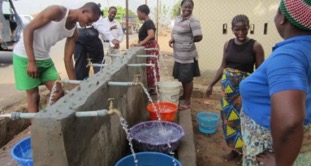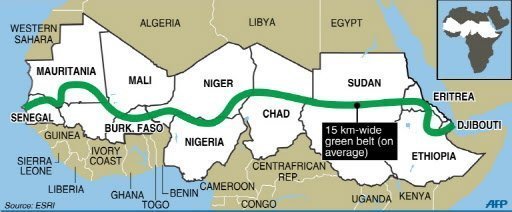The water need of the populace rests on the shoulders of the three tiers of government. The federal government is responsible for the development of water resources and its allocation to the states. The state governments in turn are responsible for the supply of the water to end users in the state, while the local government areas are responsible for the provision of rural water supplies. It is therefore within the purview of the responsibility of the government to provide taxpayers with safe, portable and sufficient pipe borne water.

As of September 2016 Worldometer estimates that Nigeria is a country with population of over 180 million people. It is blessed with numerous water bodies – lakes, rivers and streams across its lengths and breadths. It is rather an unfortunate paradox and a false premise that there is limited water in the country. Water is absolutely a necessity to life. This is fact relativists and absolutists would agree. Virtually every aspect of humankind’s day-to-day activities requires water.
According to Omole David, a researcher with Covenant University, only 14% of Nigeria’s population has regular portable pipe water for drinking and domestic use. Sixty percent of the population is left completely off the grid to source water for its consumption from surface and underground sources. Governments provide treated water from sources of dammed large bodies such as rivers, lakes and streams while on the other hand private citizens source their waters from surface (direct scooping from streams and rivers) and underground sources.

In Nigeria, groundwater is assessed primarily through the shallow (hand-dug wells and reservoirs) or deep percolation bore holes which are mechanically augered until an aquifer sufficient enough to provide regular water flow is reached. It is a well-known practice that in many Nigerian cities, residential and commercial developments have borehole construction incorporated.
Impacts of unsustainable groundwater abstraction
Unsustainable water abstraction has marked effects on the environment, especially in the long-term. From loss of water head and aqua-terrestrial transition zones to loss of aqua life and biodiversity, over abstraction of ground water results in the drying up of wells, saltwater intrusion, land subsidence and also expose the ground to risk of human-induced landslides, tremors and earthquakes. This is because the natural water which would normally maintain balance underneath have been exploited faster than it can be replenished by rainfall thereby leaving only the soil fabric with numerous void spaces and fault lines and joints and causing fracking.
Healthwise, groundwater over abstraction with no regards to sustainability especially in developing societies like ours leaves upper aquifer exposed to salt water and wastewater intrusion from nearby sources of municipal wastes which contaminates the groundwater. The consequences of contaminated groundwater to health are devastating especially to newborns and children. According to UN WATER, water-related diseases kill 6 to 8 million people annually in developing countries. This figure relates to more than ten times the number killed in wars in the developing countries, especially Africa. In Nigeria, it is estimated that 130,000 children under five years die annually from waterborne diseases. WaterAid Nigeria reports that an estimated number of 45,000 children under five years die annually from diarrhea alone, a water related illness.
Constant and unsustainable over abstraction of groundwater has been noted by scientists to form an exposed underground stratification leaving it susceptible to jolts and earthquakes. In California for instance, researchers have warned that the groundwater over exploitation for agricultural and domestic use have been increasing the chances for earthquakes in San Andreas. Likewise, in Ohio, groundwater overexploitation has been raising the potential of quakes and causing fracking. A related research also in Sierra Nevada and the Coastal Ranges showed that the annual rising of the Ranges (between 1 and 3 millimeters) may be human-induced.
We have been made to believe that our dear Nigeria is a country with very minimum chances of natural disasters. The recent earth tremors in Bayelsa and in Kwoi, a settlement in southern Kaduna are making us rethink this assertion. Although causes of these tremors have not yet been confirmed, human activities will not be removed from the probable causes. Oil and gas exploration, mining activities and water over abstraction could be responsible for the tremors.
Sustainable groundwater abstraction
While it is within the rights of citizens to source alternative water supply it is also recommended that sustainable practices are adopted in groundwater abstraction. Borehole proliferation has become a problem across the many developed and developing countries today. Water is exploited for domestic, industrial and agricultural uses across the globe.
But how do sustainable practices checkmate these? Sustainable water abstraction refers to the processes where the water is exploited from the ground without compromising the integrity of the environment and sustainable development. Most groundwater exploitation in Nigeria is unregulated which is why borehole proliferation has been rising astronomically. It is necessary first and foremost that people are intimated the dangers of unsustainable practices.
Sustainable groundwater exploration can only be achieved where the relevant authorities such as the 12 River Basin Authorities conduct and collate detailed hydrological study of the groundwater information in order to regulate borehole construction and groundwater exploration and also offer recommendation on the best practices to be adopted. Groundwater abstraction should also be made primarily from deep percolation sources since it has less chances of contamination by foreign bodies such as herbicides and other agricultural wastes. Shallow exploration should be adopted only where it has little to no effects on neighboring waterbodies.
Excessive and particularly indiscriminate groundwater exploration and use is casting a huge doubt in the minds of many over its sustainability. It is a necessity that government provides its populace with safe and portable pipe water. It is also necessary that the people provide themselves with the needed water from alternative sources especially where government reneges on this responsibility. This should however be done without compromising sustainable development. In essence therefore, groundwater exploration for domestic and industrial use should be done sustainably so that the future does not suffer the consequences of our indiscrimination.
[blog_subscription_form]
Blog written by
 Abdulmumin Tanko has a master’s degree in Civil Engineering with an insatiable desire for research and writing. A staunch environmental enthusiast and a fervent campaigner for environmental consciousness, he works to break the silence and end the nescience, largely responsible for environmental indiscretion. . He believes that a serene and safer environment begins with YOU. Follow him on Twitter @Tikaysmalls
Abdulmumin Tanko has a master’s degree in Civil Engineering with an insatiable desire for research and writing. A staunch environmental enthusiast and a fervent campaigner for environmental consciousness, he works to break the silence and end the nescience, largely responsible for environmental indiscretion. . He believes that a serene and safer environment begins with YOU. Follow him on Twitter @Tikaysmalls



This was a beautiful, well researched and comprehensive article. A lot of the issues are common to India as well, the difference being urban areas are more regulated in terms of it’s groundwater exploitation. Being a large country, the groundwater levels vary, and so do the types of pollution, so it is really up to state authorities and local scientists to work towards proper ground water management.
Thank you Saurab. Groundwater exploitation is multidisciplinary and to achieve its sustainability it must be viewed at that perspective. Like you have mentioned the government (local, state and federal), scientists, public and corporate individuals must all work together and ensure that all that we do does not compromise sustainable development.
Pingback: #GoGreen2017: Some bad environmental practices to leave behind in 2016 | Green Habitat Sustainable Development Initiative